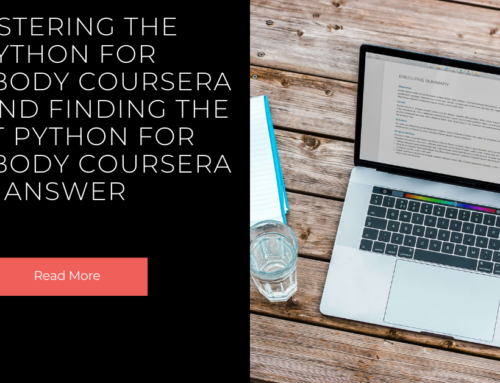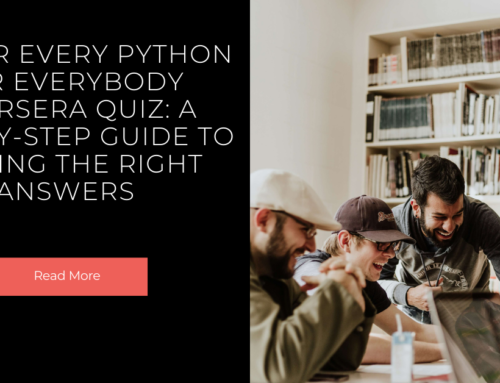Coursera’s Python for Everybody specialization is among the most well-liked programs for novices who want to learn Python programming. Every module contains a Python for Everybody Coursera quiz that is intended to assess your knowledge of fundamental programming ideas, such as functions, file management, data types, and loops. For many students, particularly those who are new to coding, figuring out the right Python for Everybody Coursera answer might be difficult. We’ll offer tips and tools in this post to assist you confidently and accurately ace every test.

Know the Main Ideas in Each Module
To pass any Python for Everybody Coursera quiz, you must first make sure you fully comprehend the fundamental ideas presented in each module. Built around certain programming concepts, like strings, lists, or dictionaries, each quiz is intended to assess your understanding and application skills. Review lecture videos, go over course notes, and take thorough notes on important issues. Having a firm understanding of the subject will help you locate the appropriate Python for Everybody Coursera answer for every query.

Practice with Examples of Real-World Coding
Practice is the key to learning programming. Examine real-world coding examples to get ready for the Python for Everybody Coursera quiz. You can use what you’ve learned in the course by completing interactive coding exercises offered by Coursera. Moreover, you can practice outside of the quiz setting by using tools like Google Colab or Jupyter Notebook. Actively coding and working through simple difficulties can improve your comprehension and give you greater assurance when determining the right Python for Everybody Coursera answer.

Make Use of Coursera’s Resources for Extra Help
To ensure your success on the Python for Everybody Coursera quiz, Coursera provides an abundance of resources. Check the readings for the course, go over the lecture slides again, and participate on the discussion boards. When it comes to solving common problems and learning from other students who may have encountered similar difficulties, the forums are especially helpful. In addition to helping you find the correct Python for Everybody Coursera answer when you’re unclear about a question, using these resources can help you understand complex ideas.

Take a Methodical Approach to Answering Difficult Questions
Some quiz questions may appear difficult, particularly if they call for coding solutions or require several steps. Address these questions in a methodical manner. To determine the question’s primary elements, break it down into its inputs, intended outputs, and necessary procedures. You can lower the possibility of mistakes and get the right Python for Everybody Coursera answer more easily if you approach each section methodically. Programming requires the ability to solve problems, which this method also helps you develop.

Examine comments and grow from errors
Following each Python for Everybody Coursera quiz, you can get feedback on your responses from Coursera, which is a useful tool for getting better. If you provided a wrong response to a question, spend some time reading the comments and comprehending why the Python for Everybody Coursera answer is what it is. You may learn from your mistakes and take future tests with more confidence thanks to this feedback, which helps you pinpoint areas where you might need to improve your knowledge. You will noticeably enhance your quiz performance if you keep studying and growing.

Conclusion: Proper Approaches Lead to Quiz Success
It takes experience, planning, and a methodical approach to problem-solving to ace the Python for Everybody Coursera quiz. Finding precise Python for Everybody Coursera answer answers for each quiz will be possible if you fully comprehend the fundamental ideas, practice with real-world examples, make use of Coursera’s resources, and read through feedback. Keep in mind that every quiz is an opportunity to solidify your knowledge and acquire a solid foundation in Python programming. Using the appropriate techniques can help you succeed in future programming problems as well as on the tests.





